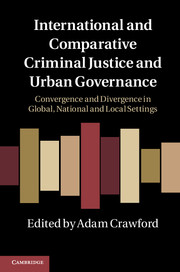 International and Comparative Criminal Justice and Urban Governance
International and Comparative Criminal Justice and Urban Governance from PART 1 - International criminal justice
Published online by Cambridge University Press: 05 June 2011
Introduction
The title of this chapter may appear somewhat ambiguous at first sight, as it implies both an empirical and a normative question. Do universal crimes lead to universal justice? And should universal crimes lead to universal justice? However, as with all crime, the very nature of the phenomenon and any intellectual inquiry into it are normative matters and the questions as to whether we either have, or should have, universal justice cannot be regarded as separate issues. Moreover, the answer depends on many things, but most importantly on who is asking the question, who is doing the answering, and what they define as crime and as justice. In international legal-political terms, universal justice and universal crimes are equated with the definitions found in the international instruments providing procedures for judging and sanctions against specifically delineated ‘core international crimes’: genocide, crimes against humanity and war crimes. Logically, universal justice then becomes the reaction of the international community through ad hoc tribunals or the International Criminal Court (ICC), or the incorporation of such international definitions into national criminal law and procedure according to the universality principle of jurisdiction.
However, the fact that we have a body of international criminal law that can be institutionally upheld does not of itself mean that we have universal justice. Neither should the legitimacy of the international response be taken for granted. For, to be legitimate, any form of justice must deliver in many senses of the word – and universal justice must deliver universally.
To save this book to your Kindle, first ensure no-reply@cambridge.org is added to your Approved Personal Document E-mail List under your Personal Document Settings on the Manage Your Content and Devices page of your Amazon account. Then enter the ‘name’ part of your Kindle email address below. Find out more about saving to your Kindle.
Note you can select to save to either the @free.kindle.com or @kindle.com variations. ‘@free.kindle.com’ emails are free but can only be saved to your device when it is connected to wi-fi. ‘@kindle.com’ emails can be delivered even when you are not connected to wi-fi, but note that service fees apply.
Find out more about the Kindle Personal Document Service.
To save content items to your account, please confirm that you agree to abide by our usage policies. If this is the first time you use this feature, you will be asked to authorise Cambridge Core to connect with your account. Find out more about saving content to Dropbox.
To save content items to your account, please confirm that you agree to abide by our usage policies. If this is the first time you use this feature, you will be asked to authorise Cambridge Core to connect with your account. Find out more about saving content to Google Drive.